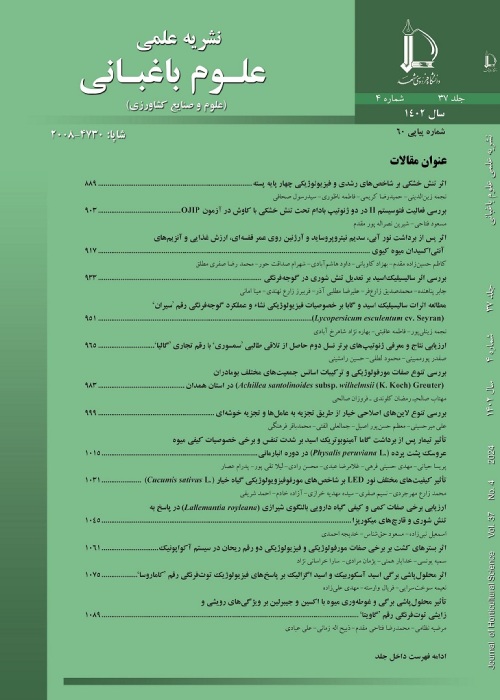The Effect of Application of Vermi-compost and Plant Growth Promoting Bacteria (PGPR) on Yield, Vegetative Traits and Secondary Metabolites of Basil (Ocimum basilicuum L.)
Author(s):
Article Type:
Research/Original Article (دارای رتبه معتبر)
Abstract:
Introduction
Inefficient and excessive use of chemical fertilizers in agriculture has caused soil erosion and pollution of water resources and has also been effective in reducing the quality of crops. On the other hand, the use of beneficial soil microorganisms as bio-organic enhances soil fertility, and results in healthier and richer nutritional needs is a further harvest away from ecosystem contamination. Increase crop in terms of quantity and quality without damaging the farm ecosystem, especially medicinal plants. Bio-fertilizers are the latest development in organic farming. They are also a gift from modern agricultural science that should replace chemical fertilizers on farms which play a vital role in maintaining long-term soil fertility and stability. Ocimum basilicuum is a grown aromatic and medicinal plant that is a leafy vegetable of the Labiatae family. This plant has different healing properties and is also used to flavor various food products due to its special taste. Therefore, in this study with the aim of providing a practical solution to reduce the use of artificial fertilizers and environmental pollution, the effect of vermicompost and biological fertilizers on the composition of secondary metabolites and growth of basil (Ocimum basilicuum) was studied.Materials and Methods
This study was conducted in 2017-2018 to investigate the effects of vermicompost and biological fertilizers on some traits of basil (Ocimum basilicuum) in of Azadshahr in Golestan province. In this experiment, application of vermicompost at three levels (a1: no application, a2: application at a rate of 10% and a3: application at a rate of 20% by weight of soil) and application of biological fertilizers at three levels (b1: no application, b2: use of Bacillus subtillis, b3: use of natural element compounds) were examined. The experiment was carried out in a randomized complete block design with three replications in the exterior space as a pot culture. The alcoholic extract used in this study was performed by soaking. The amount of total phenol compounds was measured by the Folin Siocalto method and the total flavonoid content was measured by aluminum chloride colorimetric method. Data obtained from experiments using the software SAS Ver. 9.1 and comparison of means was performed using the least significant difference test (LSD). Excel software was also used to draw the graphs.Results and Discussion
The results of analysis of variance showed that the application of vermicompost was significant on root fresh and dry weight, fresh and dry weight of stem, stem length, fresh and dry weight of leaves and leaf area. Also, the effect of biological fertilizers on root fresh weight and stem dry weight was significant. Comparison of means also showed that vermicompost 20% compared to control and vermicompost 10% in traits such as fresh weight of root (5.14), dry weight of root (7.25), fresh weight of stem (25.23), dry weight of stem (2.25), length stem (33.77), fresh weight of leaf (51.85), dry weight of leaf (8/08) and leaf area (75.13) had the highest values. No significant effect was observed between vermicompost and biological fertilizers. The maximum amount of total phenol in vermicompost treatments belonged to 20% vermicompost at 1.98 mg/g, and in biological fertilizers treatments to Probio96 at 1.96 mg/g. Also, the maximum levels of total flavonoids in plants treated with vermicompost were 20% and Probio 96 were 92.13 mg/g and 91.22 mg/g, respectively. The results show that vermicompost had the greatest effect on target organs such as leaf area, fresh and dry weight of basil leaves.Conclusion
The trade and cultivation of medicinal and aromatic plants is an important part of agriculture. Medicinal and aromatic plants are the main source of known medicines. Therefore, obtaining methods to increase the yield and therapeutic indicators of medicinal plants is of particular importance. In the growth of medicinal plants and biomass production, the quality of raw materials used is important. Chemical fertilizers have several adverse effects on the environment and human health. These effects can include leaching and displacement of various soil layers, groundwater and surface water pollution, accumulation of heavy metals and nitrates, air pollution, acid rain, and chemical accumulation in plants, animals, and human tissues. According to the findings, it is generally recommended to use bio-fertilizers such as vermicompost and Probiot 96 as a suitable alternative to chemical fertilizers in plant nutrition to protect the environment, human health and the positive economic effects of medicinal plantsKeywords:
Language:
Persian
Published:
Journal of horticulture science, Volume:36 Issue: 3, 2022
Pages:
591 to 602
magiran.com/p2512658
دانلود و مطالعه متن این مقاله با یکی از روشهای زیر امکان پذیر است:
اشتراک شخصی
با عضویت و پرداخت آنلاین حق اشتراک یکساله به مبلغ 1,390,000ريال میتوانید 70 عنوان مطلب دانلود کنید!
اشتراک سازمانی
به کتابخانه دانشگاه یا محل کار خود پیشنهاد کنید تا اشتراک سازمانی این پایگاه را برای دسترسی نامحدود همه کاربران به متن مطالب تهیه نمایند!
توجه!
- حق عضویت دریافتی صرف حمایت از نشریات عضو و نگهداری، تکمیل و توسعه مگیران میشود.
- پرداخت حق اشتراک و دانلود مقالات اجازه بازنشر آن در سایر رسانههای چاپی و دیجیتال را به کاربر نمیدهد.
In order to view content subscription is required
Personal subscription
Subscribe magiran.com for 70 € euros via PayPal and download 70 articles during a year.
Organization subscription
Please contact us to subscribe your university or library for unlimited access!


